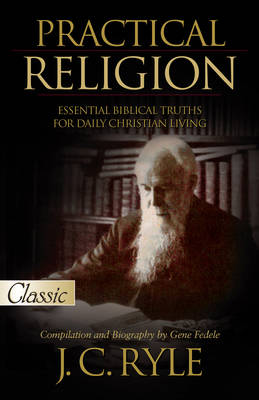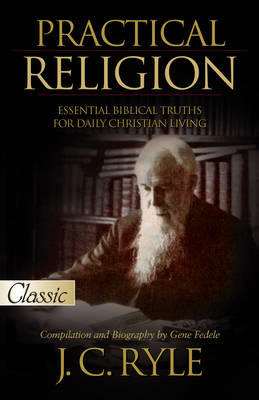
- Retrait gratuit dans votre magasin Club
- 7.000.000 titres dans notre catalogue
- Payer en toute sécurité
- Toujours un magasin près de chez vous
- Retrait gratuit dans votre magasin Club
- 7.000.0000 titres dans notre catalogue
- Payer en toute sécurité
- Toujours un magasin près de chez vous
27,95 €
+ 55 points
Format
Description
Practical Religion, by J. C. Ryle (1816-1900), was first published in 1878 and is renowned as a theological and apologetic Christian "classic"--esteemed for its clear, profound and penetrating narrative on the practice of genuine Christian living. Within its pages, Ryle masterfully unfolds practical biblical truths in a series of treatises, or "papers" as he calls them, each written to address a critical aspect of where personal faith in Christ and the practice of that faith in holy living unite and are essential for Christian growth and effectiveness as a witness for Christ in the world.
Ryle exposes hypocrisy and nominalism in religion, or "Churchianity" as he calls it, which was as systemic in his day as it is today. His poignant narrative appeals to the Church as well as to individuals who profess to be Christians--a call to self-examination in all things, and a return to sound Biblical truths seriously and practically applied in every aspect of Christian life. Some of the subjects addressed include: Self-Inquiry, Reality, Prayer, Bible Reading, Zeal, Formality, The World, Sickness, Riches and Poverty, Eternity, among others.
Ryle's unique style penetrates the heart and challenges the mind of its readers and is not for the faint of heart--but is designed for those who genuinely and humbly seek a deeper abiding, surrendered life in Christ. No wonder his equally renowned contemporary English minister, Charles Spurgeon, called him "an evangelical champion. One of the bravest and best of men."
J. C. (John Charles) Ryle was the first Bishop of Liverpool, and one of the most influential evangelical ministers and writers of the nineteenth century.
Ryle quotes from Practical Religion:
"Real" religion is not mere show, and pretense, and skin-deep feeling, and temporary profession, and outside work. It is something inward, solid, substantial, intrinsic, living, lasting. A lack of reality is a striking feature of a vast amount of religion in the present day.
The subject is of deep importance in every age. There has never been a time, since the Church of Christ was founded, when there has not been a vast amount of unreality and mere nominal religion among professing Christians. I am sure it is the case in the present day - It is not the Christianity of Peter, and James, and John, and Paul. It is Churchianity - and nothing more!
Ryle exposes hypocrisy and nominalism in religion, or "Churchianity" as he calls it, which was as systemic in his day as it is today. His poignant narrative appeals to the Church as well as to individuals who profess to be Christians--a call to self-examination in all things, and a return to sound Biblical truths seriously and practically applied in every aspect of Christian life. Some of the subjects addressed include: Self-Inquiry, Reality, Prayer, Bible Reading, Zeal, Formality, The World, Sickness, Riches and Poverty, Eternity, among others.
Ryle's unique style penetrates the heart and challenges the mind of its readers and is not for the faint of heart--but is designed for those who genuinely and humbly seek a deeper abiding, surrendered life in Christ. No wonder his equally renowned contemporary English minister, Charles Spurgeon, called him "an evangelical champion. One of the bravest and best of men."
J. C. (John Charles) Ryle was the first Bishop of Liverpool, and one of the most influential evangelical ministers and writers of the nineteenth century.
Ryle quotes from Practical Religion:
"Real" religion is not mere show, and pretense, and skin-deep feeling, and temporary profession, and outside work. It is something inward, solid, substantial, intrinsic, living, lasting. A lack of reality is a striking feature of a vast amount of religion in the present day.
The subject is of deep importance in every age. There has never been a time, since the Church of Christ was founded, when there has not been a vast amount of unreality and mere nominal religion among professing Christians. I am sure it is the case in the present day - It is not the Christianity of Peter, and James, and John, and Paul. It is Churchianity - and nothing more!
Spécifications
Parties prenantes
- Auteur(s) :
- Editeur:
Contenu
- Nombre de pages :
- 512
- Langue:
- Anglais
- Collection :
Caractéristiques
- EAN:
- 9781610362641
- Date de parution :
- 01-04-22
- Format:
- Livre broché
- Format numérique:
- Trade paperback (VS)
- Dimensions :
- 140 mm x 213 mm
- Poids :
- 517 g

Les avis
Nous publions uniquement les avis qui respectent les conditions requises. Consultez nos conditions pour les avis.






